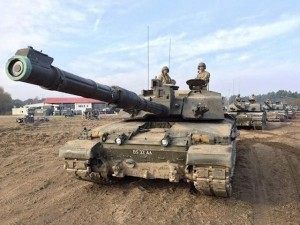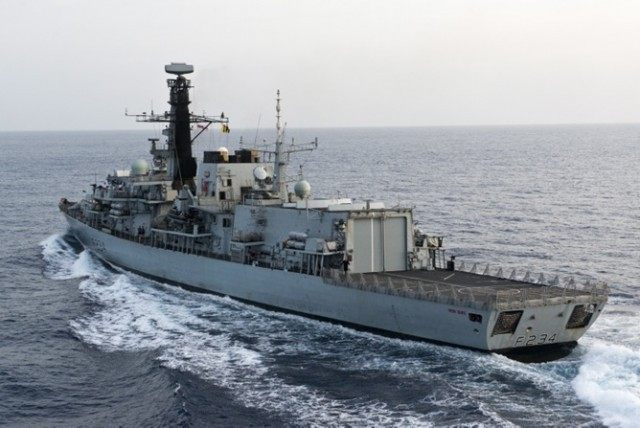Britain is to send troops to Ukraine to help train their soldiers in the fight against Russian backed separatist forces. Non-lethal equipment will also be supplied to Ukraine as a show of friendship, Prime Minister David Cameron has confirmed.
Mr Cameron has said that the consequences of failing to stand up to Russian President Vladimir Putin would be “deeply damaging”. He predicting that Mr Putin could look next towards the Baltic States or Moldova if he is not held back now, the Telegraph has reported. Mr Cameron said that Mr Putin had opted out of the “rules based system” of the twenty first century, and warned the Russian President that he must expect consequences for doing so.

One of the 100 British Main Battle and Light Tanks Deployed to Poland in November to Repel a Simulated Invasion / Ministry of Defence
Downing Street have confirmed 75 British military personnel would be deployed to Ukraine. Over 100 tanks and 1,300 personel were already deployed to eastern Europe at the end of last year, as part of ‘Operation Black Eagle’, an enormous live-firing war-game training exercise. The joint exercise between Poland and Britain simulated the defence of a fictional eastern European country invaded by Russia.
Giving evidence to the Commons Liaison Committee, Mr Cameron said: “We are not at the stage of supplying lethal equipment. We have announced a whole series of non-lethal equipment, night-vision goggles, body armour, which we have already said that we will give to Ukraine.
“Over the course of the next month we are going to be deploying British service personnel to provide advice and a range of training, from tactical intelligence to logistics to medical care, which is something else they have asked for.
“We will also be developing an infantry training programme with Ukraine to improve the durability of their forces. This will involve a number of British service personnel, they will be away from the area of conflict but I think this is the sort of thing we should be helping with.”
Last week a British Army veteran who volunteered for the Ukrainian forces attested that up to 60 percent of Ukrainian casualties are down to friendly fire and lack of competence. The soldier known only as “Saffron” said that the troops were in disarray under a command that “confuses tactics with strategy”, and a volunteer brigade made up of “jobless, aimless people who joined the force but are unwilling to learn discipline”.
Speaking to the Committee, Mr Cameron ruled stronger action at this stage, although he conceded “I don’t say we should rule out forever going further”. But, in his opinion “we don’t believe fundamentally there is some military solution to this issue. There needs to be a diplomatic solution which needs to be enabled by sanctions and pressure and the economic weight of Europe and America but obviously where we can help a friend in non-lethal equipment we should.”
The decision to deploy troops comes as Chancellor George Osborne is forced to admit that defence spending as a percentage of GDP may fall below two percent by 2017. The figure is significant, as under Nato rules all members must commit to spend at least two percent on their military. Presently only four countries, including Britain, do.
At a Nato summit last September, held in Wales, at which the commitment was reconfirmed, Mr Cameron called on the countries who were not meeting the target to do so, saying that Britain would “aim to continue” to meet it herself.
Defence spending has been falling year on year over the last few decades. In 1985/86 when the Soviet threat was already starting to dissipate, British defence spending was at 5.2 percent of GDP. By 2013/14 it had dropped to just 2.2 percent, in part thanks to austerity cuts which saw 20,000 personnel stripped from the Army, and a further 10,000 from the Airforce and Navy combined.
Britain “took a pause on” the ability to launch war planes from ships at sea thanks to a decision to scrap the Harrier Jump Jet fleet in 2010. Even more alarmingly, the decision to scrap a multi-billion pound program to build a replacement Nimrod aircraft left the country without any maritime patrol aircraft, at a time when Russian submarines are known to be within British waters. Late last year, Nato allies had to be called upon to provide sea patrol planes to search for a Russian submarine that had been spotted off the coast of Scotland; France, Canada and America all donated aircraft who joined Royal Navy warships in hunting the craft.
The cuts have caused Tory MPs and Nato allies alike to warn that Mr Putin will only be emboldened by any failure to protect defence spending. Anders Fogh Rasmussen, a former Nato general secretary and former Danish Prime Minister told the Telegraph earlier this month that failure to meet the two percent spending target “would send, not least under current circumstances, a very, very bad signal to Russia, to terrorists, to others – an indication of what I would call retrenchment and retreat.
“It is quite the opposite [of what] we need right now. We need free societies, the liberal democracies, to step up to the plate and demonstrate a clear economic commitment to defence and security.”
He added: “It sends a signal to the forces of oppression that the forces of freedom don’t feel committed to invest sufficiently in their own security and that can, of course, only encourage those forces of oppression to continue their aggression against free societies.”
And conservative MP Dr Liam Fox called on the spirit of Denis Healy during the cold war, quoting: “once we cut defence expenditure to the extent where our security is imperilled, we have no houses, we have no hospitals, we have no schools. We have a heap of cinders”.

COMMENTS
Please let us know if you're having issues with commenting.